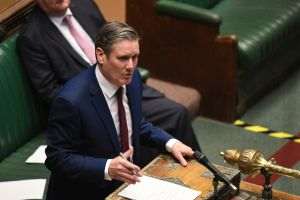The economic turnaround plan proposed by the Orban government hasn't thrilled the experts, because according to its contents, it doesn't seem meant to quickly resolve the dramatic situation which tens of thousands of microenterprises that have been affected by the quarantine are faced with. Especially since the regulations for the implementation of this plan will be passed within a maximum of 30 days, according to the statement made by PM Ludovic Orban in the beginning of yesterday's government meeting.
This was also noted by Florin Jianu, the president of the Romanian National Council of Small and Medium Enterprises of Romania (CNIPMMR), who told us the following:
"Aside from the measures and the amounts proposed by the Government, what is important is the timing. The more time we waste implementing these measures, the more it will be difficult for the SMEs to continue their operations and to keep the jobs. We salute the program proposed by the Government and the measures set for SMEs, start-ups and where computerization is concerned, but unfortunately it has no clear objectives and strict implementation deadlines. At this moment, over 120,000 SMEs need the urgent intervention of the Government to continue their activity. We believe that it is easier to regain competitiveness, than to resume activity from zero or to create new companies to replace those that have disappeared because of the current crisis. Any day of delay in the implementation of this plan means another dramatic day for SMEs".
Economic analyst Aurelian Dochia shared a similar opinion with us. He says that the recovery of the economy cannot be under the control of the authorities, because the causes that generated the current crisis cannot be substantially influenced, especially if we analyze the recovery in terms of the behavior of consumers, who have become more reluctant in buying some products.
"I think the most important direction that the Government could take is that of public investment that generates multiple effects in several economic sectors. However, the plan drawn up by the Government does not offer us anything precise and detailed for this year. Therefore, I believe that we will not have immediate positive effects for the economy before the end of this year, and I believe that at this time the Government does not have a solution to provide massive support for the private business sector. What could be done is only for the short term, just to support the economy and I predict that by the end of 2020, the crisis in the business sector will deepen, because most small companies no longer have the necessary funds for their current operation, and some activities in the HoReCa segment will not be able to resume even after the state of alert is over", Aurelian Dochia told us.
• Dochia: "None of the solutions proposed by the Government will have immediate positive effects for companies that are already in financial and economic difficulty"
He said that the European money that the Government relies on to offer grants to SMEs for working capital and investments has a long usage cycle and is not a solution for the immediate rescue of companies facing serious financial problems caused by the current quarantine. The economic analyst also claims that the companies that passed the first wave of the crisis recorded in May-June will not be able to handle the second wave that may follow in the next period and will have to close their doors.
Aurelian Dochia specified: "There will be chain effects, which will be reflected in the balance sheets of the banks and of the business partners of the respective companies, effects which in the end will lead to a significant decrease of tax receipts. By the end of the year, the shock wave in the private business sector will spread more than the authorities have predicted. I don't think that the government currently has a solution on hand to prevent this".
He also claims that we need to take into account the fact that some of the changes that have occurred in the economy will be permanent and that we will need to adapt to the new manner of operation of the economy.
"Sometimes, the steps taken by the authorities may not be more than money down the drain. Spending tens of millions of Euros just to keep alive companies that by the end of 2020 or 2021 will disappear, because they won't have a line of business, will prove pointless. Of course, this economic recovery plan is needed, but we must be realistic that no solution proposed by the Government will have immediate positive effects for companies already facing economic and financial difficulties", Aurelian Dochia said.
• Limited fiscal room for the Government
Regarding the dramatic situation that SMEs are going through, Adrian Codirlaşu, the president of CFA Romania, mentioned that the Government did still support the business environment through the SME Invest program and through the payment of furlough.
"The fiscal room is very limited this year. The immediate support of the business environment depends very much on the evolution of the current pandemic. If we do not get rid of the pandemic quickly, the Government does not have money at the moment to inject in the economy, because it must take care of the good functioning of the public health sector. The only solution would be European money, but we will only have access to it from the beginning of next year. With a potential second wave of the pandemic, the Romanian economy has no resources and will enter a prolonged recession. It is essential that we do not reach that stage", Adrian Codirlaşu told us.
If the economic recovery plan is followed through, there is an urgent need for clear implementation deadlines, especially with regard to short-term measures such as those concerning supporting companies for working capital and investments, says Dragoş Cabat, CFA.
He said that for the private sector, the Government has done everything in its power at the moment with the money available to the state budget, but for a greater and quicker support either European funds will be necessary, or coming up with alternative sources for funding the measures stipulated in the economic recovery plan.
Dragoş Cabat said: "I doubt there is money or that we have the operational capability to implement such a plan. We just don't have the funds, we don't have the minds and the manpower. That is why I think that microenterprises will have a lot to suffer in the coming period. Microenterprises represent a collateral victim of the fact that the current crisis caught us unfunded because of the budgetary imbalances of the last 3-4 years".
He noted that if we were in Germany's financial situation, then small businesses would have stood a real chance of recovering from the current crisis caused by the Covid-19 pandemic.
Ionuţ Dumitru, the former president of the Fiscal Council, told us that the plan launched by the Government is a medium-term strategy and that it is not an immediate investment or quick financial support for the business sector.
Ionuţ Dumitru said: "We are talking about large projects that will take place over a long period of time. The plan does not meet the immediate needs of the business sector, rather, it is a strategic vision for several years. That is demonstrated by the lack of deadlines, the ambiguity of funding sources, although we will probably get the bulk of the funding from the European Commission, where, for the multi-annual financial exercise 2021-2027, Romania has almost doubled its allocations compared to the previous period. Unfortunately for the business sector, this year the Government is forced to use the domestic budgetary resources and the remaining European grants, and the budget equation for the current year is very complicated ".
The former president of the Fiscal Council also told us that the plan does not meet the expectations of business people, who would have liked the urgent resolution of some projects, but he mentioned that their expectations should have been limited to the currently available budgetary resources
THE ECONOMIC TURNAROUND PROGRAM OF THE PNL
A new development strategy for Romania that completely ignores the Bucharest Stock Exchange
The Orban government published yesterday the economic turnaround program for the next five years, and in keeping with the good habit of governments in recent decades, the capital market is completely ignored.
The words "listing" or "stock exchange" appear only once together (!), on page 76 of the 160-page document, and that is only to mention as "possible" the eventual listing of the Romanian Investment Fund mega-fund, a private-equity entity.
It is well known that the local capital market has been almost completely ignored by the political class in the 25 years since its reappearance - one of the exceptions being the listing of state-owned companies during the Ponta government. The last explicit political promise concerning the development of the stock market goes back to the summer of 2019, when Finance minister in office at the time, Eugen Teodorovici, was saying that within two months he would propose a number of measures and steps to follow in order to reach the emerging market status. The decision to promote the Romanian stock market to emerging came afterwards, but not because of the measures proposed by the PSD government, measures which weren't even publicly presented - Teodorovici did however brag on Facebook by reaping the rewards of the FTSE Russell announcement.
However, in the public sector, a new idea from the authorities concerning the funding of the real economy through the stock exchange has made the rounds. It is worth mentioning simply because it has actually appeared, because it has not been implemented. According to Hotnews.ro, certain institutions are considering an instrument to facilitate SME access to capital through funding instruments listed on the stock market - the idea behind it being the creation of a fund which would have as shareholders the FNGCIMM, the FRC, FEI, BERD etc. -, with areas targeted being the IT sector, SMEs that export and those that innovate.
When he took office, the new minister, a liberal and former banker, Florin Cîţu, said he wanted to list some large state-owned companies, the ones that have remained profitable. However, the current government's concern with the development of the capital market did not even go beyond the listing of government securities issued to the public through the Tezaur (Treasury Program), the prospectus of the recent issue being copied from the PSD government - which raises the question of why the program was put on hold for so long?
However, an idea from the authorities regarding the financing of the real economy through the stock exchange mechanisms appeared in the public space. This is worth mentioning, however, only in the light of the fact that it appeared, because the stage is still the idea. According to Hotnews.ro, some institutions are thinking of a tool to facilitate the access to capital of innovative SMEs through financing instruments listed on the capital market - the idea behind being the creation of a fund in which shareholders should be FNGCIMM, FRC, FEI, EBRD etc. -, the targeted areas being the IT sector, SMEs that export and SMEs that innovate.
Driving investment is a development strategy for Romania, but in terms of the capital market, the national program (a kind of governing program for the next five years) proposed by the Liberals is disappointing. If in Poland the interest and efforts of the state have contributed decisively to the development of the capital market, in Romania the political class seems to be and will continue to be indifferent where the capital market is concerned. (MG)























































